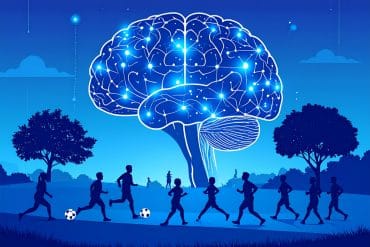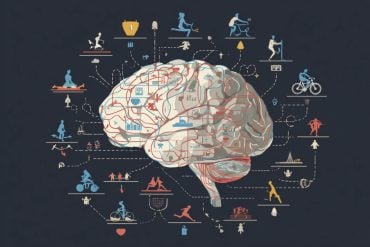Scientists find some educational attainment genes are shared with health outcomes such as Alzheimer’s disease, bipolar disorder and schizophrenia.
An international group of 253 scientists has conducted one of the largest genetic studies to date and identified 74 genetic variants that are associated with the years of formal education that an individual completes.
The study was published on May 11 by the journal Nature.
“This study builds on our earlier work in which we had studied 100,000 individuals and found three genetic variants linked to educational attainment,” said Daniel Benjamin, corresponding author and an associate professor of the Center for Economic and Social Research in the USC Dornsife College of Letters, Arts and Sciences. “This time, because of our much larger sample – almost 300,000 individuals – we were able to identify far more genetic variants that are associated with educational attainment.”
Benjamin said that genetic and environmental factors both account for variation in how much schooling a person receives. Genes only partially influence cognitive abilities and personality traits, such as persistence, that in turn affect the number of years one spends in school.
“Educational attainment is jointly influenced by genes and environment,” he said. “The genetic variants that we found account for a small fraction of the differences across individuals in education.”
Study details
The scientists combined results from 64 datasets comprising subjects in 15 different countries. The researchers identified the genetic variants associated with an individual’s total years of education. The analysis was restricted to people of European descent.
The total influence of the 74 identified genetic variants is small, explaining about 0.43 of 1 percent of the variation in educational attainment across individuals, the scientists wrote.
“For the variant with the largest effect, the difference between people with zero copies and those who have two copies of the variant predicts, on average, about nine more weeks of schooling,” Benjamin said.
The results suggest that the genetic influences on educational attainment are spread across thousands, if not millions, of genetic variants, most of which have not yet been identified, Benjamin said.
“The very small effects of individual genetic variants is itself an important finding, which echoes what we’ve seen in our own earlier work,” Benjamin said. “It means that simplistic interpretations of our results, such as calling them ‘genes for education,’ are totally misleading. At the same time, despite the small effects of individual genetic variants, the results are useful because we can learn a lot from studying the combined effects of the genetic variants taken all together.”
By combining their own results with data from previous studies, the researchers found that many of the genes associated with educational attainment are influential in brain development, even before birth. The scientists said these genes likely play a role in cognitive function and personality traits, such as grit, that matter for school performance.

“The tiny genetic differences we found may ultimately help to understand why some people are more susceptible to early cognitive decline than others,” said Peter Visscher, another senior author of the study and a professor at the Queensland Brain Institute. Referring to the voluminous additional analyses contained in the paper’s 144 pages of supplementary material, Visscher said, “It is a rich vein of material which, when applied responsibly, adds to our understanding of the human condition.”
The interdisciplinary team – which included medical researchers and psychologists — also studied whether the genetic variants associated with educational attainment overlap with genetic variants linked to health-related outcomes. They found some of the genes also predict risk for Alzheimer’s disease, bipolar disorder and schizophrenia.
The study was led by the Social Science Genetic Association Consortium, which was co-founded by Benjamin, David Cesarini of New York University and Philipp Koellinger of the Vrije Universiteit Amsterdam. The consortium investigates the influence of genetics on human behavior, well-being and social science-related outcomes through large-scale studies of human genomes.
Funding: Funding for the study came from several sources: the Ragnar Soderberg Foundation, the Swedish Research Council, the Jan Wallander and Tom Hedelius Foundation, an ERC Consolidator Grant, the Pershing Square Fund of the Foundations of Human Behavior, and National Institute on Aging/National Institutes of Health grants. Scientists utilized the UK Biobank Resource to conduct the research.
Source: Emily Gersema – USC
Image Source: The image is in the public domain.
Original Research: Abstract for “Genome-wide association study identifies 74 loci associated with educational attainment” by Aysu Okbay, Jonathan P. Beauchamp, Mark Alan Fontana, James J. Lee, Tune H. Pers, Cornelius A. Rietveld, Patrick Turley, Guo-Bo Chen, Valur Emilsson, S. Fleur W. Meddens, Sven Oskarsson, Joseph K. Pickrell, Kevin Thom, Pascal Timshel, Ronald de Vlaming, Abdel Abdellaoui, Tarunveer S. Ahluwalia, Jonas Bacelis, Clemens Baumbach, Gyda Bjornsdottir, Johannes H. Brandsma, Maria Pina Concas, Jaime Derringer, Nicholas A. Furlotte, Tessel E. Galesloot, Giorgia Girotto, Richa Gupta, Leanne M. Hall, Sarah E. Harris, Edith Hofer, Momoko Horikoshi, Jennifer E. Huffman, Kadri Kaasik, Ioanna P. Kalafati, Robert Karlsson, Augustine Kong, Jari Lahti, Sven J. van der Lee, Christiaan deLeeuw, Penelope A. Lind, Karl-Oskar Lindgren, Tian Liu, Massimo Mangino, Jonathan Marten, Evelin Mihailov, Michael B. Miller, Peter J. van der Most, Christopher Oldmeadow, Antony Payton, Natalia Pervjakova, Wouter J. Peyrot, Yong Qian, Olli Raitakari, Rico Rueedi, Erika Salvi, Börge Schmidt, Katharina E. Schraut, Jianxin Shi, Albert V. Smith, Raymond A. Poot, Beate St Pourcain, Alexander Teumer, Gudmar Thorleifsson, Niek Verweij, Dragana Vuckovic, Juergen Wellmann, Harm-Jan Westra, Jingyun Yang, Wei Zhao, Zhihong Zhu, Behrooz Z. Alizadeh, Najaf Amin, Andrew Bakshi, Sebastian E. Baumeister, Ginevra Biino, Klaus Bønnelykke, Patricia A. Boyle, Harry Campbell, Francesco P. Cappuccio, Gail Davies, Jan-Emmanuel De Neve, Panos Deloukas, Ilja Demuth, Jun Ding, Peter Eibich, Lewin Eisele, Niina Eklund, David M. Evans, Jessica D. Faul, Mary F. Feitosa, Andreas J. Forstner, Ilaria Gandin, Bjarni Gunnarsson, Bjarni V. Halldórsson, Tamara B. Harris, Andrew C. Heath, Lynne J. Hocking, Elizabeth G. Holliday, Georg Homuth, Michael A. Horan, Jouke-Jan Hottenga, Philip L. de Jager, Peter K. Joshi, Astanand Jugessur, Marika A. Kaakinen, Mika Kähönen, Stavroula Kanoni, Liisa Keltigangas-Järvinen, Lambertus A. L. M. Kiemeney, Ivana Kolcic, Seppo Koskinen, Aldi T. Kraja, Martin Kroh, Zoltan Kutalik, Antti Latvala, Lenore J. Launer, Maël P. Lebreton, Douglas F. Levinson, Paul Lichtenstein, Peter Lichtner, David C. M. Liewald, LifeLines Cohort Study, Anu Loukola, Pamela A. Madden, Reedik Mägi, Tomi Mäki-Opas, Riccardo E. Marioni, Pedro Marques-Vidal, Gerardus A. Meddens, George McMahon, Christa Meisinger, Thomas Meitinger, Yusplitri Milaneschi, Lili Milani, Grant W. Montgomery, Ronny Myhre, Christopher P. Nelson, Dale R. Nyholt, William E. R. Ollier, Aarno Palotie, Lavinia Paternoster, Nancy L. Pedersen, Katja E. Petrovic, David J. Porteous, Katri Räikkönen, Susan M. Ring, Antonietta Robino, Olga Rostapshova, Igor Rudan, Aldo Rustichini, Veikko Salomaa, Alan R. Sanders, Antti-Pekka Sarin, Helena Schmidt, Rodney J. Scott, Blair H. Smith, Jennifer A. Smith, Jan A. Staessen, Elisabeth Steinhagen-Thiessen, Konstantin Strauch, Antonio Terracciano, Martin D. Tobin, Sheila Ulivi, Simona Vaccargiu, Lydia Quaye, Frank J. A. van Rooij, Cristina Venturini, Anna A. E. Vinkhuyzen, Uwe Völker, Henry Völzke, Judith M. Vonk, Diego Vozzi, Johannes Waage, Erin B. Ware, Gonneke Willemsen, John R. Attia, David A. Bennett, Klaus Berger, Lars Bertram, Hans Bisgaard, Dorret I. Boomsma, Ingrid B. Borecki, Ute Bültmann, Christopher F. Chabris, Francesco Cucca, Daniele Cusi, Ian J. Deary, George V. Dedoussis, Cornelia M. van Duijn, Johan G. Eriksson, Barbara Franke, Lude Franke, Paolo Gasparini, Pablo V. Gejman, Christian Gieger, Hans-Jörgen Grabe, Jacob Gratten, Patrick J. F. Groenen, Vilmundur Gudnason, Pim van der Harst, Caroline Hayward, David A. Hinds, Wolfgang Hoffmann, Elina Hyppönen, William G. Iacono, Bo Jacobsson, Marjo-Riitta Järvelin, Karl-Heinz Jöckel, Jaakko Kaprio, Sharon L. R. Kardia, Terho Lehtimäki, Steven F. Lehrer, Patrik K. E. Magnusson, Nicholas G. Martin, Matt McGue, Andres Metspalu, Neil Pendleton, Brenda W. J. H. Penninx, Markus Perola, Nicola Pirastu, Mario Pirastu, Ozren Polasek, Danielle Posthuma, Christine Power, Michael A. Province, Nilesh J. Samani, David Schlessinger, Reinhold Schmidt, Thorkild I. A. Sørensen, Tim D. Spector, Kari Stefansson, Unnur Thorsteinsdottir, A. Roy Thurik, Nicholas J. Timpson, Henning Tiemeier, Joyce Y. Tung, André G. Uitterlinden, Veronique Vitart, Peter Vollenweider, David R. Weir, James F. Wilson, Alan F. Wright, Dalton C. Conley, Robert F. Krueger, George Davey Smith, Albert Hofman, David I. Laibson, Sarah E. Medland, Michelle N. Meyer, Jian Yang, Magnus Johannesson, Peter M. Visscher, Tõnu Esko, Philipp D. Koellinger, David Cesarini and Daniel J. Benjamin in Nature. Published online May 11 2016 doi:10.1038/nature17671
Abstract
Genome-wide association study identifies 74 loci associated with educational attainment
Educational attainment is strongly influenced by social and other environmental factors, but genetic factors are estimated to account for at least 20% of the variation across individuals. Here we report the results of a genome-wide association study (GWAS) for educational attainment that extends our earlier discovery sample of 101,069 individuals to 293,723 individuals, and a replication study in an independent sample of 111,349 individuals from the UK Biobank. We identify 74 genome-wide significant loci associated with the number of years of schooling completed. Single-nucleotide polymorphisms associated with educational attainment are disproportionately found in genomic regions regulating gene expression in the fetal brain. Candidate genes are preferentially expressed in neural tissue, especially during the prenatal period, and enriched for biological pathways involved in neural development. Our findings demonstrate that, even for a behavioural phenotype that is mostly environmentally determined, a well-powered GWAS identifies replicable associated genetic variants that suggest biologically relevant pathways. Because educational attainment is measured in large numbers of individuals, it will continue to be useful as a proxy phenotype in efforts to characterize the genetic influences of related phenotypes, including cognition and neuropsychiatric diseases.
“Genome-wide association study identifies 74 loci associated with educational attainment” by Aysu Okbay, Jonathan P. Beauchamp, Mark Alan Fontana, James J. Lee, Tune H. Pers, Cornelius A. Rietveld, Patrick Turley, Guo-Bo Chen, Valur Emilsson, S. Fleur W. Meddens, Sven Oskarsson, Joseph K. Pickrell, Kevin Thom, Pascal Timshel, Ronald de Vlaming, Abdel Abdellaoui, Tarunveer S. Ahluwalia, Jonas Bacelis, Clemens Baumbach, Gyda Bjornsdottir, Johannes H. Brandsma, Maria Pina Concas, Jaime Derringer, Nicholas A. Furlotte, Tessel E. Galesloot, Giorgia Girotto, Richa Gupta, Leanne M. Hall, Sarah E. Harris, Edith Hofer, Momoko Horikoshi, Jennifer E. Huffman, Kadri Kaasik, Ioanna P. Kalafati, Robert Karlsson, Augustine Kong, Jari Lahti, Sven J. van der Lee, Christiaan deLeeuw, Penelope A. Lind, Karl-Oskar Lindgren, Tian Liu, Massimo Mangino, Jonathan Marten, Evelin Mihailov, Michael B. Miller, Peter J. van der Most, Christopher Oldmeadow, Antony Payton, Natalia Pervjakova, Wouter J. Peyrot, Yong Qian, Olli Raitakari, Rico Rueedi, Erika Salvi, Börge Schmidt, Katharina E. Schraut, Jianxin Shi, Albert V. Smith, Raymond A. Poot, Beate St Pourcain, Alexander Teumer, Gudmar Thorleifsson, Niek Verweij, Dragana Vuckovic, Juergen Wellmann, Harm-Jan Westra, Jingyun Yang, Wei Zhao, Zhihong Zhu, Behrooz Z. Alizadeh, Najaf Amin, Andrew Bakshi, Sebastian E. Baumeister, Ginevra Biino, Klaus Bønnelykke, Patricia A. Boyle, Harry Campbell, Francesco P. Cappuccio, Gail Davies, Jan-Emmanuel De Neve, Panos Deloukas, Ilja Demuth, Jun Ding, Peter Eibich, Lewin Eisele, Niina Eklund, David M. Evans, Jessica D. Faul, Mary F. Feitosa, Andreas J. Forstner, Ilaria Gandin, Bjarni Gunnarsson, Bjarni V. Halldórsson, Tamara B. Harris, Andrew C. Heath, Lynne J. Hocking, Elizabeth G. Holliday, Georg Homuth, Michael A. Horan, Jouke-Jan Hottenga, Philip L. de Jager, Peter K. Joshi, Astanand Jugessur, Marika A. Kaakinen, Mika Kähönen, Stavroula Kanoni, Liisa Keltigangas-Järvinen, Lambertus A. L. M. Kiemeney, Ivana Kolcic, Seppo Koskinen, Aldi T. Kraja, Martin Kroh, Zoltan Kutalik, Antti Latvala, Lenore J. Launer, Maël P. Lebreton, Douglas F. Levinson, Paul Lichtenstein, Peter Lichtner, David C. M. Liewald, LifeLines Cohort Study, Anu Loukola, Pamela A. Madden, Reedik Mägi, Tomi Mäki-Opas, Riccardo E. Marioni, Pedro Marques-Vidal, Gerardus A. Meddens, George McMahon, Christa Meisinger, Thomas Meitinger, Yusplitri Milaneschi, Lili Milani, Grant W. Montgomery, Ronny Myhre, Christopher P. Nelson, Dale R. Nyholt, William E. R. Ollier, Aarno Palotie, Lavinia Paternoster, Nancy L. Pedersen, Katja E. Petrovic, David J. Porteous, Katri Räikkönen, Susan M. Ring, Antonietta Robino, Olga Rostapshova, Igor Rudan, Aldo Rustichini, Veikko Salomaa, Alan R. Sanders, Antti-Pekka Sarin, Helena Schmidt, Rodney J. Scott, Blair H. Smith, Jennifer A. Smith, Jan A. Staessen, Elisabeth Steinhagen-Thiessen, Konstantin Strauch, Antonio Terracciano, Martin D. Tobin, Sheila Ulivi, Simona Vaccargiu, Lydia Quaye, Frank J. A. van Rooij, Cristina Venturini, Anna A. E. Vinkhuyzen, Uwe Völker, Henry Völzke, Judith M. Vonk, Diego Vozzi, Johannes Waage, Erin B. Ware, Gonneke Willemsen, John R. Attia, David A. Bennett, Klaus Berger, Lars Bertram, Hans Bisgaard, Dorret I. Boomsma, Ingrid B. Borecki, Ute Bültmann, Christopher F. Chabris, Francesco Cucca, Daniele Cusi, Ian J. Deary, George V. Dedoussis, Cornelia M. van Duijn, Johan G. Eriksson, Barbara Franke, Lude Franke, Paolo Gasparini, Pablo V. Gejman, Christian Gieger, Hans-Jörgen Grabe, Jacob Gratten, Patrick J. F. Groenen, Vilmundur Gudnason, Pim van der Harst, Caroline Hayward, David A. Hinds, Wolfgang Hoffmann, Elina Hyppönen, William G. Iacono, Bo Jacobsson, Marjo-Riitta Järvelin, Karl-Heinz Jöckel, Jaakko Kaprio, Sharon L. R. Kardia, Terho Lehtimäki, Steven F. Lehrer, Patrik K. E. Magnusson, Nicholas G. Martin, Matt McGue, Andres Metspalu, Neil Pendleton, Brenda W. J. H. Penninx, Markus Perola, Nicola Pirastu, Mario Pirastu, Ozren Polasek, Danielle Posthuma, Christine Power, Michael A. Province, Nilesh J. Samani, David Schlessinger, Reinhold Schmidt, Thorkild I. A. Sørensen, Tim D. Spector, Kari Stefansson, Unnur Thorsteinsdottir, A. Roy Thurik, Nicholas J. Timpson, Henning Tiemeier, Joyce Y. Tung, André G. Uitterlinden, Veronique Vitart, Peter Vollenweider, David R. Weir, James F. Wilson, Alan F. Wright, Dalton C. Conley, Robert F. Krueger, George Davey Smith, Albert Hofman, David I. Laibson, Sarah E. Medland, Michelle N. Meyer, Jian Yang, Magnus Johannesson, Peter M. Visscher, Tõnu Esko, Philipp D. Koellinger, David Cesarini and Daniel J. Benjamin in Nature. Published online May 11 2016 doi:10.1038/nature17671






